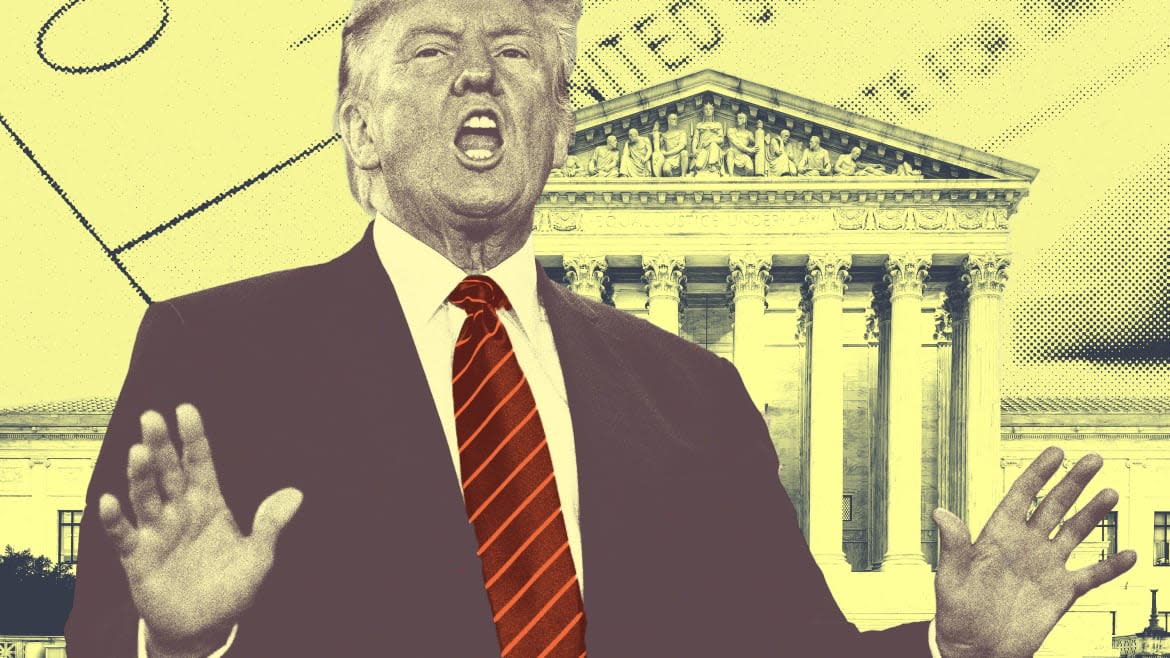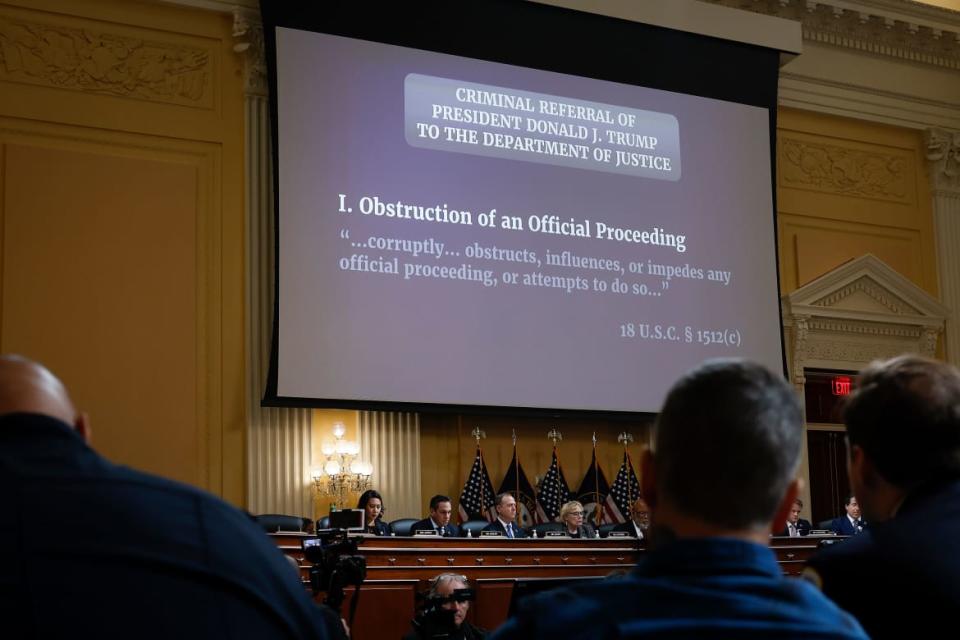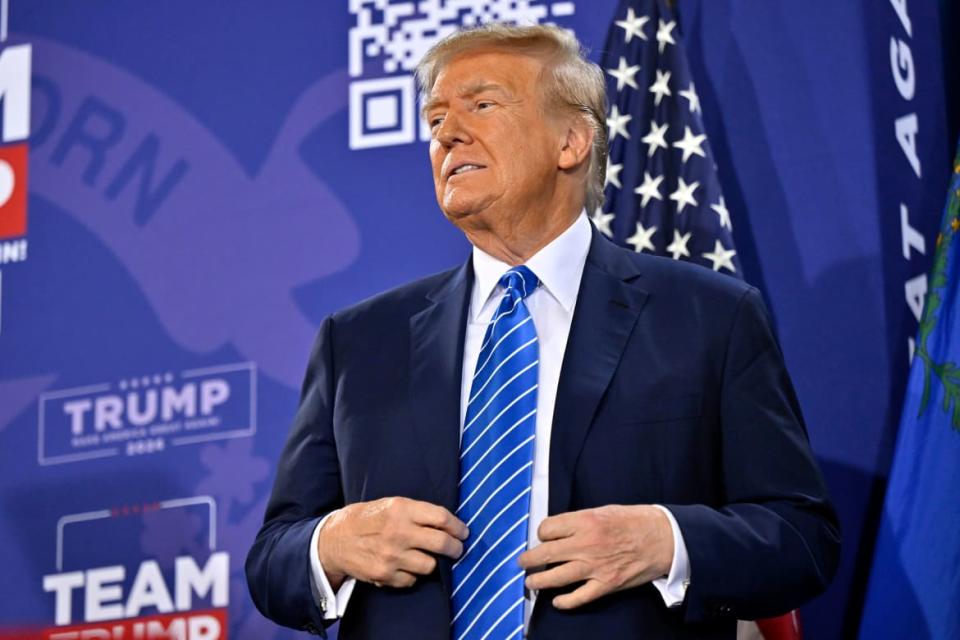Is There Any Chance the Supreme Court Kicks Trump Off the Colorado Ballot?

- Oops!Something went wrong.Please try again later.
- Oops!Something went wrong.Please try again later.
- Oops!Something went wrong.Please try again later.
On Thursday, the Supreme Court will hear oral arguments in Trump v. Anderson, where former President Donald Trump seeks to overturn the Colorado Supreme Court ruling that Section 3 of the 14th Amendment means “Trump is disqualified from holding the office of President because he ‘engaged in insurrection’ against the Constitution of the United States—and that he did so after taking an oath ‘as an officer of the United States’ to ‘support’ the Constitution.”
The Supreme Court’s current conservative majority typically claims its decisions interpreting the Constitution rest upon so-called originalist methods that are informed by the Constitution’s text, history, and traditions. Since the late 19th century, Section 3 has rarely been an important legal issue before our courts. This year is the first time since Reconstruction that an accused insurrectionist is a serious contender for the presidency.
As the D.C. District Court opinion explained earlier this week, when it found that the former president is not immune from prosecution for acts taken while in office, “Former President Trump’s alleged efforts to remain in power despite losing the 2020 election were, if proven, an unprecedented assault on the structure of our government.”
The Supreme Court Shouldn’t Even Hear Trump’s Appeal on Immunity Ruling
Thursday’s oral arguments could provide clues about how the justices view this comparatively ambiguous legal history, in light of the common complaint that originalism is not a search for historical truth, but rather a tool used to selectively manipulate historical evidence to justify the decision-makers’ preferred result.
One of the issues the justices are likely to explore is Trump’s claim that Colorado cannot disqualify him from appearing on its 2024 ballot because Section 3 of the 14th Amendment is not self-executing; it can only be enforced by congressional legislation, which does not exist.
Is this correct?
“Friend of the court” briefs submitted by two groups of distinguished historians offer compelling evidence that Trump is wrong and Section 3 is “self-executing,” automatically disqualifying those who violate it from holding office.
The historians’ evidence includes statements made by the 14th Amendment’s framers and supporters during congressional debates. This evidence confirms that Section 3 not only barred ex-Confederates from holding office, it also guarded “against the corruption of government by anyone involved in future insurrections who had taken an oath to support the U.S. Constitution,” and required no additional congressional action to impose that disqualification.

Members of the House Select Committee to investigate the Jan. 6 attack hold their last public meeting in the Canon House Office Building on Dec. 19, 2022.
The historians’ evidence also demonstrates that when it wanted to, Congress passed legislation disqualifying Confederate rebels. In 1862, six years before ratification of Section 3, Congress passed another statute commanding that “every person guilty of either of the offenses described in this Act shall be forever incapable and disqualified to hold any office under the United States.”
Five years later, Congress enacted another disqualification law targeted at former Confederate rebels. This occurred shortly after Congress enacted the 14th Amendment, but before it was ratified by the States in 1868. When necessary, Congress passed disqualification statutes, but did not do so with Section 3, instead adopting a constitutional rule as self-executing the First, Fourth, and Fifth Amendments ratified in 1791.
The historians also present evidence that former leaders and members of the Confederacy recognized that Section 3 automatically disqualified them from holding public office.
During the convoluted treason case against him, former Confederate President Jefferson Davis argued that he was immune from treason charges because “he was already punished through his automatic disqualification to hold public office under Section 3, which ‘executes itself… It needs no legislation on the part of Congress to give it effect.’”
I Prosecuted Donald Trump and Won. Here’s How It’s Done.
In that case, Davis’ lawyer argued that Section 3 “needs no legislation on the part of Congress to give it effect” because disqualification automatically “commenced upon the date of the adoption of the fourteenth article, and he therefore could not now be punished in any other way.”
Similarly, in the years following ratification of the 14th Amendment, fifteen or sixteen thousand former rebels petitioned Congress asking it to remove their automatic disqualifications with a two-thirds vote of both houses, as authorized by Section 3. In response, Congress passed an amnesty law that preserved the disqualification of some former rebels, including Jefferson Davis, President of the Confederacy, out of fear he might be elected as President of the United States. “Newspapers continued to observe that, without Section Three, Davis or another ex-Confederate might become President of the United States,” one of the historians’ amicus briefs noted.
Trump offers competing historical evidence supporting his argument that he cannot be disqualified because no congressional legislation enforcing Section 3 exists. For example, Trump relies on the 1869 judicial opinion in Griffin’s Case—a murder conviction where the convicted Griffin argued that his sentence was invalid because Section 3 automatically and retroactively disqualified the Virginia trial judge, invalidating his official acts.

Former President Donald Trump stands on stage during a campaign event at Big League Dreams Las Vegas on Jan. 27, 2024 in Las Vegas, Nevada.
Trump’s lawyers argue that “Chief Justice Chase held that congressional implementing legislation is the only way that section 3 may be enforced, and that state and federal courts are powerless to enforce section 3 absent congressional enforcement legislation under section 5” of the 14th Amendment.
This sentence exemplifies how lawyers manipulate history to support their arguments. Each statement in that sentence in Trump’s Supreme Court brief is true, but each is also misleading. Samuel Chase was indeed chief justice in 1869, but this was not a Supreme Court opinion creating binding national precedent for future disputes. Chase decided the case alone, acting as a circuit court judge handling legal disputes in Virginia.
Chase, in fact, did rule that congressional enforcement legislation enacted under Section 5 of the 14th Amendment was needed to enforce Section 3, but the opinion rested upon the unique facts of the case and may be irrelevant for insurrections after 1868.
Trump Would Be a Rogue Cop With Presidential Immunity
Chase decided that Section 3 does apply to “all persons in the category of prohibition, and for all time present and future,” but he also concluded that Section 3 did not retroactively invalidate Griffin’s sentence because the judge had taken office before adoption of the 14th Amendment. When a person had been appointed or elected to office before passage of the 14th Amendment, they were ineligible to hold office under Section 3, but “[l]egislation by Congress was necessary” for removal of the judge from office.
Even if Chase’s opinion is correct, its holding seems relevant only to the removal of people holding public office before 1868. It does not appear to help insurrectionists who violated their public oaths 150 years later and then seek to regain public office.
This judicial opinion seems less weighty than the contrary evidence offered by professional historians, but the Griffin case is part of the historical record before the Supreme Court. Thursday may offer the first look at which history the justices will adopt.
Get the Daily Beast's biggest scoops and scandals delivered right to your inbox. Sign up now.
Stay informed and gain unlimited access to the Daily Beast's unmatched reporting. Subscribe now.

